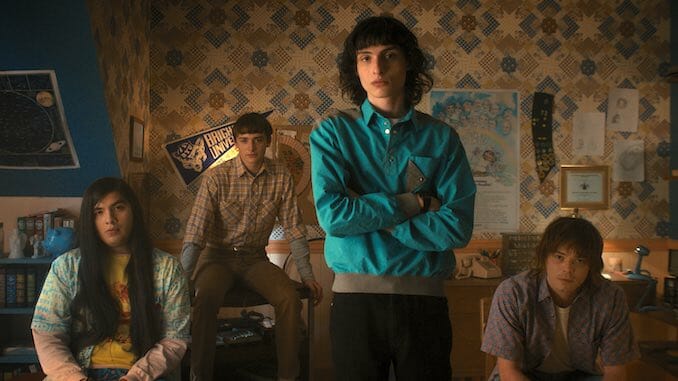The Decline of Netflix and the Return of Stranger Things
Photo Courtesy of Netflix
I remember when Stranger Things was about to become the Next Big Thing. It was July 2016; I was on summer break from my junior year of college and working at my retail job over the summer. My coworkers were talking excitedly about some new Netflix show. “It’s really scary,” I remember one telling me. “It’s got Winona Ryder!” another had said. “You literally can’t stop watching it once you start,” someone else had probably urged to me as well. I can still see myself at my laptop in my bedroom in my childhood home, curiously googling “Stranger Things” to understand what my coworkers were talking about. Already, the show was gaining traction. A handful of articles awarded positive reactions and praise, particularly for Ryder’s performance, promising that audiences were about to become hooked on the sci-fi/horror ‘80s throwback hybrid because, well, they were. When I finally sat down to watch, the above sentiments from my coworkers turned out to be true. I couldn’t stop watching Stranger Things, and neither could anyone else.
Now, Stranger Things is back—and it’s got a paid campaign partnership between Doritos and Charli XCX. The pop star will be joined by ‘80s music icons the Go-Go’s, Soft Cell, and Corey Hart for a virtual concert on June 23, sponsored by the snack company in promotion of the hit series’ long-awaited fourth season. On the upcoming concert, XCX said, “Doritos is doing something really cool by giving Stranger Things fans a new way to celebrate their favorite show with ‘Live From The Upside Down.’ I can’t wait for everyone to join us for this concert!”
In retrospect, it was always going to end up this way, the ultimate apex of the increasingly craven marketing strategies with each new season, a reflection of where Netflix has ended up.
Stranger Things helped to fundamentally change both the film and television landscape hand-in-hand with its parent company, Netflix. Mark Lawson once wrote for the Guardian that the retro series “combines a distribution model that represents the future of screen entertainment with content that harks back to its past.” It’s possible that Lawson had no idea just how right this statement would be. But Stranger Things not only ushered in an excruciating, years-long era of exceedingly profitable nostalgia-bait entertainment, but operated as one of a few tentpole programs that boosted Netflix up to become a major player in creating original, prestige television series, cultivate their media stronghold, alter how and when audiences watch television, and also disrupt the traditional theatrical cinema model. Stranger Things, Orange Is the New Black, House of Cards, Black Mirror, Unbreakable Kimmy Schmidt, the various Marvel Cinematic Universe spinoff series—they all laid out the foundation for the Netflix of today.
And, well, the Netflix of today isn’t doing so hot. In the weeks after the recent announcement that Netflix suffered its most jarring subscriber loss to date (in part due to another bump in subscription prices), shares in the company are down almost 70%. Netflix expects to lose another $2 million in the next quarter, and they have laid off a generous portion of their staff in addition to pulling the plug on numerous shows. Most industry insiders knew all along that Netflix’s business model wasn’t sustainable; they throw astronomical amounts of money around, hiking up prices across the industry, and turning the market far more competitive in a way that left many studios unable to keep up. This extends to their staff as well, as in the case of their failed journalism (marketing) arm Tudum, which lured journalists away from less stable jobs for the promise of a financial safety net under employment from a perceived booming business.
-

-

-

-

-

-

-

-

-

-

-

-

-

-

-

-

-

-

-

-

-

-

-

-

-

-

-

-

-

-

-

-

-

-

-

-

-

-

-

-








































